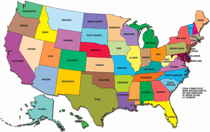
US Presidents (POTUS)
The American President is widely considered to be the most powerful person on the earth, and is usually one of the world's best-known public figures.
 John
Tyler
John
Tyler
10th President of the United States
(April 6, 1841 to March 3, 1845)
Nicknames:
-
"Accidental President"
-
"His Accidency," Derisive nickname by his opponents (as opposed to "His Excellency", for example), who suggested he could not have achieved the presidency through his own merit, only by accident (succeeding from the Vice Presidency on the death of William Henry Harrison).
John Tyler
Born: March 29, 1790, in Greenway, Virginia
Died: January 18, 1862, in Richmond, Virginia
Father: John Tyler
Mother: Mary Marot Armistead Tyler
Married: Letitia Chrisitan (1790-1842), on March 29, 1813; Julia
Gardiner (1820-1889), on June 26, 1844
Children: Mary Tyler (1815-48); Robert Tyler (1816-77); John
Tyler (1819-96); Letitia Tyler (1821-1907); Elizabeth Tyler (1823-50);
Anne Contesse Tyler (1825); Alice Tyler (1827-54); Tazewell Tyler (1830-74);
David Gardiner Tyler (1846-1927); John Alexander Tyler (1848-83); Julia
Gardiner Tyler (1849-71); Lachlan Tyler (1851-1902); Lyon Gardiner Tyler
(1853-1935); Robert Fitzwalter Tyler (1856-1927); Pearl Tyler (1860-1947)
Religion: Episcopalian
Education: Graduated from the College of William and Mary (1807)
Occupation: Lawyer
Political Party: Whig
Other Government Positions:
- Member of Virginia House of Delegates, 1811-16
- Member of US House of Representatives, 1816-21
- Virginia State Legislator, 1823-25
- Governor of Virginia, 1825-26
- United States Senator, 1827-36
- Vice President, 1841 (under W. H. Harrison)
- Member of Confederate States Congress, 1861-62
John Tyler Biography
Dubbed "His Accidency" by his detractors, John Tyler was the first
Vice President to be elevated to the office of President by the death
of his predecessor.
Born in Virginia in 1790, he was raised believing that the Constitution
must be strictly construed. He never wavered from this conviction. He
attended the College of William and Mary and studied law.
Serving in the House of Representatives from 1816 to 1821, Tyler voted
against most nationalist legislation and opposed the Missouri Compromise.
After leaving the House he served twice as Governor of Virginia. As
a Senator he reluctantly supported Jackson for President as a choice
of evils. Tyler soon joined the states' rights Southerners in Congress
who banded with Henry Clay, Daniel Webster, and their newly formed Whig
party opposing President Jackson.
The Whigs nominated Tyler for Vice President in 1840, hoping for support
from southern states'-righters who could not stomach Jacksonian Democracy.
The slogan "Tippecanoe and Tyler Too" implied flag waving nationalism
plus a dash of southern sectionalism.
Clay, intending to keep party leadership in his own hands, minimized
his nationalist views temporarily; Webster proclaimed himself "a Jeffersonian
Democrat." But after the election, both men tried to dominate "Old Tippecanoe."
Suddenly President Harrison was dead, and "Tyler too" was in the White
House. At first the Whigs were not too disturbed, although Tyler insisted
upon assuming the full powers of a duly elected President. He even delivered
an Inaugural Address, but it seemed full of good Whig doctrine. Whigs,
optimistic that Tyler would accept their program, soon were disillusioned.
Tyler was ready to compromise on the banking question, but Clay would
not budge. He would not accept Tyler's "exchequer system," and Tyler
vetoed Clay's bill to establish a National Bank with branches in several
states. A similar bank bill was passed by Congress. But again, on states'
rights grounds, Tyler vetoed it.
In retaliation, the Whigs expelled Tyler from their party. All the Cabinet
resigned but Secretary of State Webster. A year later when Tyler vetoed
a tariff bill, the first impeachment resolution against a President
was introduced in the House of Representatives. A committee headed by
Representative John Quincy Adams reported that the President had misused
the veto power, but the resolution failed.
Despite their differences, President Tyler and the Whig Congress enacted
much positive legislation. The "Log-Cabin" bill enabled a settler to
claim 160 acres of land before it was offered publicly for sale, and
later pay $1.25 an acre for it.
In 1842 Tyler did sign a tariff bill protecting northern manufacturers.
The Webster-Ashburton treaty ended a Canadian boundary dispute; in 1845
Texas was annexed.
The administration of this states'-righter strengthened the Presidency.
But it also increased sectional cleavage that led toward civil war.
By the end of his term, Tyler had replaced the original Whig Cabinet
with southern conservatives. In 1844 Calhoun became Secretary of State.
Later these men returned to the Democratic Party, committed to the preservation
of states' rights, planter interests, and the institution of slavery.
Whigs became more representative of northern business and farming interests.
When the first southern states seceded in 1861, Tyler led a compromise
movement; failing, he worked to create the Southern Confederacy. He
died in 1862, a member of the Confederate House of Representatives.
Source: http://www.whitehouse.gov/

US Presidents: Life & Accomplishments



